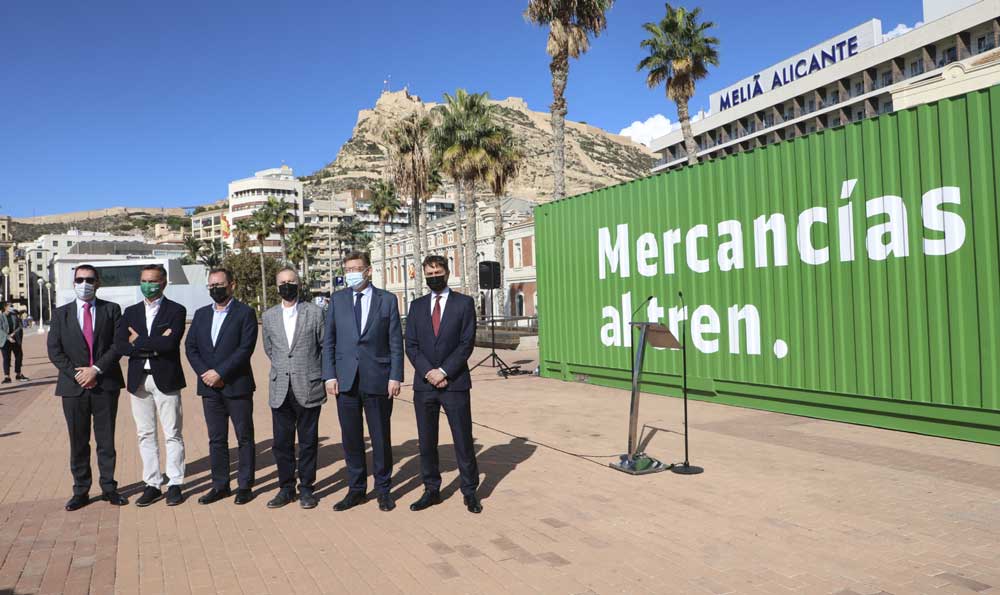The President of the Regional Government of Valencia, Ximo Puig, today visited the container installed for the ‘Freight via rail’ campaign located in the Port of Alicante.
This is a traveling European initiative that will visit several Spanish cities in the coming months, with the aim of raising awareness among public institutions, the business sector and society of the importance of transferring cargo from the road to the train to reduce emissions of CO2 from the transport sector.
The President of the Regional Government of Valencia, Ximo Puig, today visited the container for the ‘Freight via rail’ campaign located in the Port of Alicante. This is a traveling European initiative that will visit several Spanish cities in the coming months, with the aim of raising awareness among public institutions, the business sector and society of the importance of transferring cargo from the road to the train to reduce emissions of CO2 from the transport sector.
The initiative entitled ‘Freight via rail’, began on 29 October in Valencia, and brings together railway companies, public institutions, customers and institutions that fight against climate change and wants to convey to the whole society the importance of reducing the carbon footprint. In this way, it is intended to make society aware of the need to reduce transport, responsible for 30% of total emissions, intelligently combining rail and road transport before 2030.
During the presentation ceremony in Alicante, the member of the Executive Committee of Transfesa Logistics, Samuel Nevado, explained the reason for the central message of the container that arrives in Alicante today “the railroad is the key to reducing CO2 emissions from the transport sector which today account for almost 30% of total emissions. It is for this reason we have removed this container from the terminals and make it visible.”
Nevado has given some key data that highlight the advantages of betting on the train to preserve the environment, “transporting freight by rail reduces CO2 by up to 80%. External costs are also lowered by up to 50%. It also consumes six times less energy and is eight times better in terms of air pollution compared to other modes.”
As Nevado added, “the forecasts project that in 2030 there will be 30% more goods transported. If nothing is done, this freight will also be transported by road. Though if the share of rail freight is increased to 30% in Europe by that date we would avoid 1 million additional trucks on the road, we would generate an economic profit of €100 billion due to lower external costs and 290 million tonnes of emissions from CO2 would similarly be avoided.”
The region, key to freight exports
“Freight via rail” begins its journey in the Valencian Community, an essential area for the export of various articles and products such as fruits and vegetables, toys, cars, amongst others, which will have a lot of weight in the design of future more sustainable logistics chains. Nevado commented in Alicante that “this campaign has already been launched in Germany, in the United Kingdom… it is a European movement, it is a train that will not to stop. We started here in the Community of Valencia as it is a strategic place for freight in our country, since it is the corridor with the most rail traffic and as the Mediterranean corridor will be vital for our connection with Europe.”
A campaign with major backing
The launch of this campaign has been very well received by companies and institutions that see in the train the solution to decarbonise transport. In line with their environmental commitments, they wished to make a much-needed proposal a reality, that of caring for the environment in which they carry out their activity, designing an emissions-neutral intermodal supply chain and calling on society to form part of the change.
This has been promoted by the railway company DB Cargo and in Spain it has as collaborators with Transfesa Logistics and Renfe Mercancías Freight Division in addition to Ermewa, Medway, Puerto de Valencia, Stadler Valencia, ADIF, the Valencia City Council, AM FRESH Group, the European Parliament, the Foundation of the Spanish Railways, the Ministry of Territorial Policy, Public Works and Mobility of the Valencia Regional Government, Martinavarro, Logitren, Low Cost Rail, Railsider Logística, SanLucar, The Climate Reality Project Europe, Tobsine España sl, VTG, Port of Alicante , Port of Valencia, TMS and Anecooc

